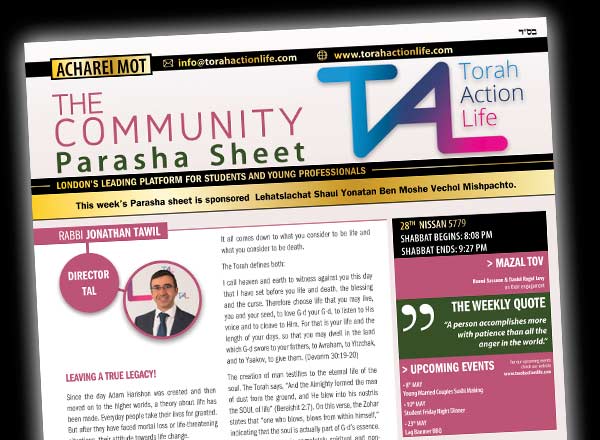
Lilui nishmat Ovi Moiri Reb Zvi Hershel ben Yakov z’l
In the beginning of this week’s Parsha the Torah describes how Yaacov was frightened of meeting his brother Esov.
The Torah uses two words to describe his fear.
Vayiro, he was frightened and Vayitzer., he was scared.
Why the double expression. ?
Rashi Hakodosh explains that Take as frightened of killing others and scared in case he would be killed.
But that also needs clarifying… it is understandable why he was scared of being killed but why was he frightened of killing others.
Yaacov wasn’t a murderer, he wasn’t going to hurt or harm his brother… if need be he would defend himself from harm which may result in his needing to kill an enemy… why was he frightened?
The Meforshim explain this by shedding light on another interesting point in the Parsha.
Yaacov told his family that he would divide them into two camps, and rationalised that even if Esov would come and destroy the first camp, nevertheless, the second group would certainly manage to flee.
How did he know this?
The Vilna Gaon explains beautifully.
At the end of Parshat Toldot, after Rivko instructed Yakov to run away she aided that she didn’t want to lose both her sons on the same day.
Yakov Ovinu understood that his mother, had just uttered deep and profound Nevuoh. He understood without a shadow of out that both himself and Esov would pass away on the same day. He therefore decided to act upon that prophecy.
Initially he separated the two groups of his family one days journey apart and with that he made the following calculation, he would go in the first group towards Esov.
Now, if Esov comes to harm the first group, he knew that he may get killed, but he was worried that even if he defended his family and killed Esov, he would also pass away on the same day which explains why he was concerned about killing Esov as this would mean he would also die.
And we can also understand why he was so cerrato at the other group would escape.
Simply put, even if Esov would overcome Yaacov and destroy the first group, Esov would be definition have to die on the same day and would be unable to reach the second group as they were one days journey away.
Perhaps I can add a thought of my own.
Great tzadikim are correctly concerned about Chillul Hashem more than their own safety.
When one lives a life Al pi Torah, he must ensure that others view him and the Torah in a positive light. It is incumbent upon all of us to live our lives as examples of Kiddush Hashem.
We ask HKBH to redeem us lmaaan shemo beahavo, for the sake of kiddush Hashem…
Yaakov Ovinu knew that he may be killed and that frightened him, but he was also concerned, that if that happens, what would people say about theufe he chose.
What would people say about the guarantee that HKBH gave him in Parshat Vayetze, that he would return to his father’s home.
That was his second worry.
As I write these lines on the day of the sheloshim of the passing of Ovi Moiri hareini kaporat mishkovo, I am grateful that I merited to see my father oh live such a wonderful and exalted lifestyle.
Just one story if I may.
Being a professor in Biochemistry and senior lecturer in university, he came into contact with hundreds of students on a daily basis.
One Friday afternoon as my father was leaving his work to come home, a student approached him. Clearly something had upset her and she was suffering from a trauma, but she said that felt suicidal.
With little time to shabbos my father said to this non Jewish student, that she should come home and spend shabbos in our home!
She did, and the non Jewish lady spent shabbos with our family and she felt better.
To this day she credits my father for having shown her a reason to live and for having shown her respect as an individual and taught her by example how to care for others.
A living kiddush Hashem.
As we mourn his loss, we are comforted by the legacy he left us.
Zecher tzadik livrocho.







